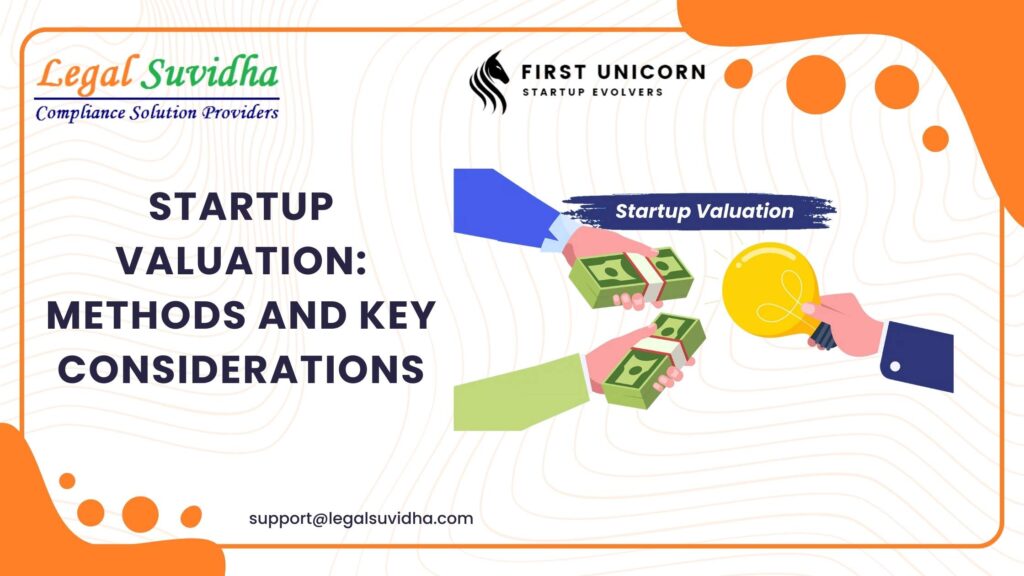Startup Valuation: Methods and Key Considerations
Startup valuation is a crucial process for both entrepreneurs and investors. It determines the worth of a startup, helping founders understand how much their business is worth in the market and guiding investors in making informed funding decisions. Unlike established companies, startups do not have a long financial history or large revenues, so valuing them involves unique considerations. This article provides a detailed explanation of the various startup valuation methods and key considerations that should be factored into the valuation process.
What is Startup Valuation?
Startup valuation refers to determining the financial worth of a startup at a particular point in time. It is used to understand the equity value of the business and helps investors and founders negotiate terms during fundraising rounds. For a startup, valuation is influenced by various factors, such as growth potential, intellectual property, market position, and team experience, among others.
Common Methods of Startup Valuation
There are several valuation methods that investors and entrepreneurs use to determine the worth of a startup. Each method has its advantages, depending on the stage of the startup and available data. The most common methods are:
1. The Comparable Company Analysis (CCA)
This method compares the startup with other companies in the same industry, ideally those that are at a similar stage of growth. The comparison is based on various financial metrics such as revenue, profit margins, market capitalization, and growth rates.
How it works:
- Identify companies that are similar to the startup in terms of size, industry, market, and product offering.
- Analyze their valuation metrics such as price-to-earnings (P/E), price-to-sales (P/S), or enterprise value to revenue (EV/R) ratios.
- Apply these multiples to the startup’s financials to estimate its value.
Example: If a startup’s revenue is $1 million and similar companies with comparable financials have a P/S ratio of 5x, the startup could be valued at $5 million.
Advantages:
- It is relatively simple and provides a clear market comparison.
- Uses real market data, which is particularly useful in sectors with a lot of comparable companies.
Limitations:
- Comparables may not always be available for early-stage or unique startups.
- The quality of the analysis depends on the relevance and quality of comparable data.
2. The Discounted Cash Flow (DCF) Method
DCF is a fundamental valuation approach based on the premise that the value of a business is equal to the present value of its future cash flows. This method is more suitable for startups that have predictable revenue streams or are approaching breakeven.
How it works:
- Estimate the startup’s projected free cash flows for the next 5-10 years.
- Choose an appropriate discount rate (usually the startup’s weighted average cost of capital or WACC).
- Calculate the net present value (NPV) of the future cash flows by applying the discount rate.
- Sum the NPV of future cash flows to determine the company’s current valuation.
Advantages:
- Provides an in-depth valuation based on future performance, which is important for long-term investment.
- Relies on the startup’s fundamentals, such as revenue growth, profitability, and operational efficiency.
Limitations:
- Requires accurate projections, which can be difficult for early-stage startups with limited data.
- Sensitive to assumptions about growth and discount rates, which can result in a wide range of valuations.
3. The Risk Factor Summation Method
This method is often used for early-stage startups and involves adjusting a base value based on various risk factors. The base value can be derived from comparable companies, or it can be set based on industry standards.
How it works:
- Start with a base value (usually the average valuation for startups in the same industry or sector).
- Adjust the value by assessing various risk factors such as:
- Management quality
- Product risk (whether the product is proven or still in development)
- Market risk (the competition or demand for the product)
- Financial risk (the startup’s financial health)
- Legal/regulatory risk
- Assign positive or negative points to each risk factor. The base valuation is then adjusted based on these scores.
Advantages:
- Easy to apply, especially for startups that don’t have robust financial data.
- Focuses on a wide range of risk factors that can impact the startup’s future success.
Limitations:
- Subjective, as it heavily relies on the evaluator’s judgment.
- Can result in inconsistent valuations unless the criteria are clear and standardized.
4. The Berkus Method
The Berkus Method is a qualitative approach developed by Dave Berkus, a well-known angel investor. This method is particularly suitable for pre-revenue startups, as it places more emphasis on the intangibles such as team experience, intellectual property, and product development.
How it works:
- Assign a value to various components of the startup, such as:
- Idea/Concept: How innovative or viable is the business idea?
- Prototype: If the startup has a working prototype or minimum viable product (MVP).
- Quality of the Management Team: Strength of the founding team and their expertise.
- Strategic Partnerships: Any key alliances or customer relationships that have been established.
- Sales/Revenue: If any early revenue has been generated.
- Each of these components gets a score (typically between $500,000 to $2 million). The total valuation is the sum of these individual components.
Advantages:
- Focuses on the factors that are most important for early-stage startups.
- Simple to apply, especially when financial metrics are unavailable.
Limitations:
- Highly subjective and dependent on the evaluator’s experience.
- May undervalue certain aspects of the business that are hard to quantify.
5. The Cost-to-Duplicate Method
This method is commonly used for startups that have a well-defined product but limited market traction. The valuation is based on how much it would cost to duplicate the startup’s technology or product.
How it works:
- Calculate the total amount of money invested in the startup so far (including development costs, R&D, marketing, etc.).
- Adjust for any proprietary technology, intellectual property, or other assets that make the startup unique.
Advantages:
- Useful for tech startups or those with a lot of intellectual property.
- Provides a baseline value based on past investment.
Limitations:
- May not reflect the startup’s future potential or market value.
- Ignores intangible factors such as market leadership and brand value.
Key Considerations for Startup Valuation
When conducting a startup valuation, several factors must be taken into account to ensure accuracy and relevance:
- Stage of the Startup: Early-stage startups are often valued based on qualitative factors such as the management team and market potential, while later-stage startups may have more financial data and are valued on financial metrics.
- Market Conditions: The current market environment plays a huge role in determining a startup’s value. In a booming market, valuations may be higher due to greater competition for investment. Conversely, in a downturn, valuations may decrease.
- Financial Performance: Startups with proven revenue growth or profitability tend to command higher valuations, as they offer a clearer path to financial success.
- Scalability: The scalability of the business model is crucial in determining the startup’s future growth potential. Startups that can scale quickly are often valued higher.
- Intellectual Property and Differentiation: A startup’s patents, trade secrets, and proprietary technology can significantly influence its valuation, especially in tech-focused industries.
- Competition and Market Position: The startup’s competitive advantage and its position within the market should be assessed. Startups with unique offerings or those in emerging markets tend to have higher valuations.
- Team Experience: Investors place significant value on the founding team’s experience and track record. A team with a proven history of success increases the startup’s credibility and market value.
Conclusion: Choosing the Right Valuation Method
Choosing the right startup valuation method depends on the stage of the business, available data, and investor preferences. Early-stage startups may rely more on qualitative methods like the Berkus Method or the Risk Factor Summation Method, while more mature startups with established revenue streams can use methods like DCF or Comparable Company Analysis. Regardless of the method chosen, understanding the key factors influencing valuation, such as market potential, competitive landscape, and the quality of the management team, is essential for both entrepreneurs and investors to arrive at a fair and accurate startup valuation.
Looking for more insights or want to start your own startup?
Are you looking for Startup Funding/Grant/Loan for your Business? Fill the below attached form today!









